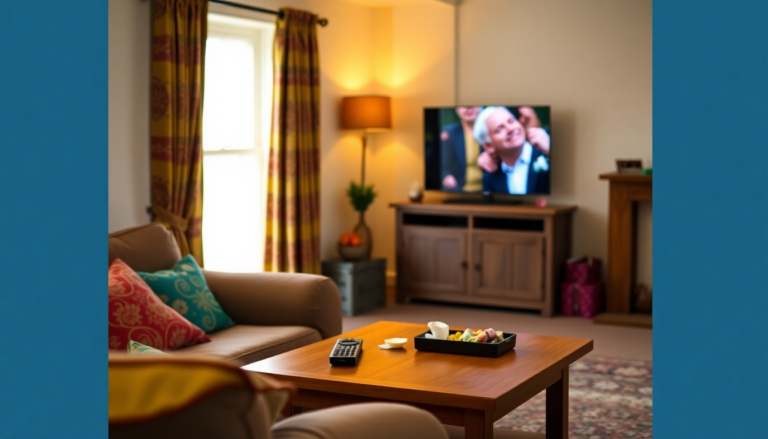Argomenti trattati
Gogglebox has become a staple of British television, captivating audiences since its debut on March 7, 2013. Created by Stephen Lambert, Tania Alexander, and Tim Harcourt, this reality series takes viewers into the living rooms of families and friends across the UK. Each episode features real people reacting to the previous week’s television, providing a hilarious and relatable commentary that resonates with a broad audience. With its unique format and engaging cast, Gogglebox has not only garnered numerous awards but also sparked a range of successful spin-offs, solidifying its place in modern TV history.
Understanding the Gogglebox phenomenon
The essence of Gogglebox lies in its ability to blend entertainment with genuine human experience. Families and friends gather in their homes, sharing laughter, tears, and opinions about the shows they love—or love to hate. This concept, while simple, taps into the universal experience of watching TV together, making it a cultural touchstone for many. The show is narrated by Craig Cash since 2016, following the late Caroline Aherne’s memorable contributions, which added a layer of warmth and humor to the series.
Over the years, Gogglebox has received numerous accolades, including BAFTA awards in 2014 and 2022, and several National Television Awards. These recognitions highlight the show’s significant impact on the television landscape, demonstrating its ability to engage and entertain viewers week after week. The creators aimed to capture the essence of real-life conversations around TV, a goal that has resonated deeply with audiences. The show’s charm lies not just in the reactions but in the authentic relationships showcased, making viewers feel like part of the family.
The creative minds behind Gogglebox
Stephen Lambert, Tania Alexander, and Tim Harcourt are the creative forces behind Gogglebox. Lambert, known for producing hits like Wife Swap and Undercover Boss, envisioned a show that would combine the lightheartedness of ITV’s Harry Hill’s TV Burp with the relatable family dynamics of the BBC’s The Royle Family. The concept originated during the 2011 London riots, when Harcourt pondered how people react to news events in their homes. Together with Alexander, they crafted a format that blends commentary with genuine interactions, resulting in a show that feels both fresh and familiar.
Despite some initial skepticism about the show’s premise, Channel 4’s David Glover recognized its potential and greenlit a mini-series after a proof of concept tape was created. The casting process was equally unique, focusing on finding relatable, humorous individuals rather than those seeking fame. This approach, described as “street casting,” has allowed the audience to connect with the cast over time, fostering a sense of community around the show.
Production insights and challenges
Filming Gogglebox involves a meticulous process that captures the genuine reactions of the cast. The production team uses small, remotely controlled cameras, allowing for an unobtrusive filming experience in the participants’ homes. Each episode is filmed over two days, with the crew working closely with the cast to ensure that their natural interactions shine through. The editing process is equally intensive, as producers sift through hours of footage to create a cohesive narrative that reflects the best moments of the week.
One challenge faced during production is ensuring that the cast remains engaged and spontaneous. Alexander has noted that reminding participants to comment and react can sometimes be necessary, as they get lost in the shows they are watching. This highlights the balance between capturing authentic reactions and maintaining the show’s entertaining pace. The production team dedicates significant time to reviewing footage and crafting narratives that resonate with viewers, which is essential to the show’s success.
Spin-offs and international adaptations
The success of Gogglebox has led to several spin-offs, expanding its reach and appeal. The children’s version, Gogglesprogs, debuted in 2015 and quickly captured the hearts of younger audiences. Vlogglebox, which features reactions from 16 to 24-year-olds, premiered in 2017, showcasing a new generation’s perspective on online content. Additionally, Celebrity Gogglebox allows famous personalities to share their reactions, adding a glamorous twist to the series.
Gogglebox’s influence has also reached international shores, with adaptations in Australia, America, Canada, and Ireland. Each version retains the show’s core concept while incorporating local flavor and cultural nuances. The Australian edition, for instance, has become a beloved fixture on local television, demonstrating the universal appeal of watching people react to television. The varied adaptations highlight Gogglebox’s ability to resonate with diverse audiences while maintaining its original charm.
The cultural significance of Gogglebox
Gogglebox is more than just a television show; it serves as a mirror reflecting contemporary life and the cultural zeitgeist. By capturing authentic family dynamics and conversations, the series fosters a sense of connection among viewers. It allows audiences to engage in shared experiences, evoking laughter and sometimes poignant reflections on life, relationships, and societal issues.
Farah Golant, a key figure in the show’s production, aptly summarized its essence: “The show isn’t really about TV. It’s about people’s lives, their relationships, their living rooms, and the way children and parents talk about TV.” This emphasis on real-life interactions elevates Gogglebox beyond simple entertainment, making it a significant cultural artifact in the realm of reality television.

